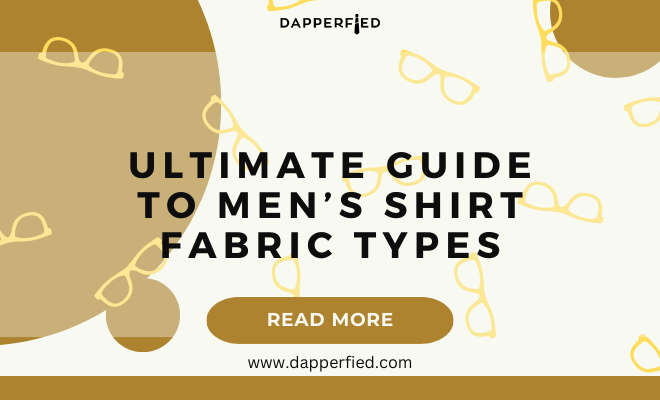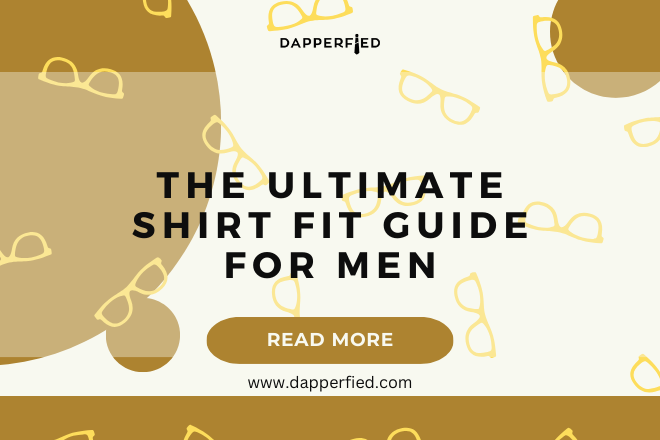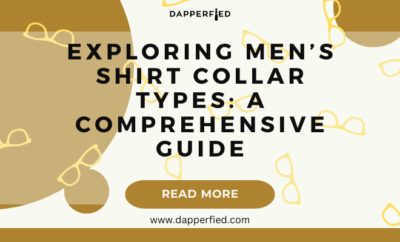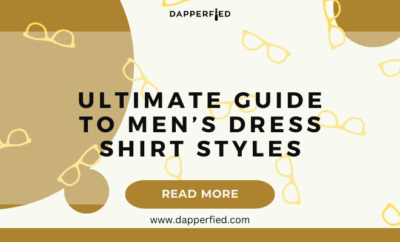
Men's Style
Ultimate Guide to Men’s Shirt Fabric Types
When it comes to men’s shirt fabrics, there are a wide variety of options to choose from, each with its own unique characteristics and qualities. Understanding the different types of fabrics can help you make an informed decision when selecting the right shirt for your style and occasion. Some of the most common shirt fabrics include cotton, linen, silk, wool, polyester, and blends of these materials. Each fabric has its own distinct texture, weight, breathability, and durability, making it suitable for different purposes and seasons.
Cotton is one of the most popular shirt fabrics due to its softness, breathability, and versatility. It is a natural fiber that is comfortable to wear in warm weather and can be easily dressed up or down. Linen is another natural fabric that is known for its lightweight and breathable properties, making it an excellent choice for summer shirts. Silk is a luxurious fabric that is smooth to the touch and has a subtle sheen, making it ideal for formal occasions. Wool is a warm and durable fabric that is often used for dress shirts in colder climates. Polyester is a synthetic fabric that is known for its wrinkle resistance and easy care, making it a practical choice for everyday wear. Understanding the characteristics of each fabric can help you choose the right shirt for your specific needs and preferences.
Key Takeaways
- Understanding the Different Types of Men’s Shirt Fabrics
- Choosing the Right Fabric for Your Style and Occasion
- The Most Popular Men’s Shirt Fabrics and Their Characteristics
- How to Care for Different Shirt Fabrics
- The Impact of Fabric Types on Comfort and Durability
- Customizing Your Shirt Fabric: Options and Considerations
- Trends in Men’s Shirt Fabrics: What’s Hot and What’s Not
Choosing the Right Fabric for Your Style and Occasion
When choosing the right fabric for your men’s shirt, it’s important to consider your personal style and the occasion for which you will be wearing the shirt. Different fabrics have different textures, weights, and drapes, which can affect the overall look and feel of the shirt. For a casual and relaxed style, you may opt for a cotton or linen shirt, as these fabrics are lightweight and breathable, perfect for everyday wear. If you’re looking for a more formal or luxurious option, silk or high-quality cotton shirts may be more suitable, as they offer a refined and elegant appearance.
The occasion also plays a significant role in determining the appropriate fabric for your shirt. For example, if you’re attending a summer wedding or outdoor event, a linen shirt would be a comfortable and stylish choice. On the other hand, if you need a shirt for business meetings or formal events, a silk or fine cotton shirt would be more appropriate. Additionally, considering the climate and season is essential when selecting the fabric for your shirt. Breathable fabrics like cotton and linen are ideal for hot weather, while wool or wool-blend shirts provide warmth and insulation in colder temperatures. By taking into account your personal style, the occasion, and the climate, you can make an informed decision when choosing the right fabric for your men’s shirt.
The Most Popular Men’s Shirt Fabrics and Their Characteristics
1. Cotton: Cotton is one of the most popular fabrics for men’s shirts due to its softness, breathability, and versatility. It is a natural fiber that is comfortable to wear in warm weather and can be easily dressed up or down. Cotton shirts are available in a wide range of weaves, including poplin, twill, oxford, and pinpoint, each with its own unique texture and appearance.
2. Linen: Linen is a natural fabric that is known for its lightweight and breathable properties, making it an excellent choice for summer shirts. Linen shirts have a relaxed and casual look, with a slightly wrinkled texture that adds to their charm. While linen is prone to wrinkles, it is highly absorbent and dries quickly, making it ideal for hot and humid climates.
3. Silk: Silk is a luxurious fabric that is smooth to the touch and has a subtle sheen, making it ideal for formal occasions. Silk shirts have a refined and elegant appearance, with a lightweight and drapey quality that sets them apart from other fabrics. While silk shirts require special care and maintenance, they offer unparalleled comfort and sophistication.
4. Wool: Wool is a warm and durable fabric that is often used for dress shirts in colder climates. Wool shirts provide insulation and are resistant to wrinkles, making them a practical choice for professional settings. They are available in different weights and textures, ranging from lightweight merino wool to heavier flannel.
5. Polyester: Polyester is a synthetic fabric that is known for its wrinkle resistance and easy care, making it a practical choice for everyday wear. Polyester shirts are durable and retain their shape well, making them suitable for travel and active lifestyles. While polyester may not have the same breathability as natural fibers, it offers excellent color retention and quick drying properties.
How to Care for Different Shirt Fabrics
| Fabric Type | Care Instructions |
|---|---|
| Cotton | Machine wash with cold water, tumble dry on low heat, iron on medium heat |
| Linen | Hand wash or machine wash on gentle cycle, hang to dry, iron on high heat |
| Silk | Dry clean or hand wash with mild detergent, hang to dry, iron on low heat |
| Wool | Dry clean or hand wash with cold water, lay flat to dry, iron on low heat with steam |
| Polyester | Machine wash with warm water, tumble dry on low heat, iron on low heat |
Proper care and maintenance are essential for preserving the quality and longevity of men’s shirt fabrics. Each type of fabric requires specific care instructions to keep it looking its best. Here are some general guidelines for caring for different shirt fabrics:
1. Cotton: Cotton shirts can be machine washed in cold or warm water and tumble dried on low heat. To prevent shrinkage and preserve color vibrancy, it’s best to wash cotton shirts inside out and avoid using bleach or harsh detergents. Ironing may be necessary to remove wrinkles, but be sure to check the label for recommended ironing temperatures.
2. Linen: Linen shirts should be hand or machine washed in cold water with a gentle detergent to avoid excessive wrinkling. It’s best to air dry linen shirts by laying them flat or hanging them on a padded hanger to maintain their shape. Light ironing may be necessary while the fabric is still damp to smooth out wrinkles.
3. Silk: Silk shirts require delicate care to maintain their luster and softness. It’s recommended to hand wash silk shirts in cold water with a mild detergent or dry clean them to avoid damage. Avoid wringing or twisting silk fabric and instead gently press out excess water with a towel before air drying.
4. Wool: Wool shirts should be dry cleaned or hand washed in cold water with a gentle detergent to prevent shrinking or felting. Avoid wringing or stretching wool fabric and gently press out excess water before reshaping the shirt and laying it flat to dry.
5. Polyester: Polyester shirts are easy to care for and can be machine washed in warm water with regular detergent. They can be tumble dried on low heat or air dried without worrying about shrinkage or wrinkles. Polyester shirts are also resistant to fading and pilling, making them low maintenance options.

The Impact of Fabric Types on Comfort and Durability
The choice of fabric has a significant impact on the comfort and durability of men’s shirts. Natural fibers like cotton, linen, silk, and wool offer breathability, moisture-wicking properties, and softness that contribute to overall comfort. These fabrics are also biodegradable and environmentally friendly, making them sustainable choices for conscious consumers. Additionally, natural fibers tend to become softer with each wash and wear, enhancing their comfort over time.
On the other hand, synthetic fibers like polyester offer durability, wrinkle resistance, and color retention that make them long-lasting options for everyday wear. Polyester shirts are less prone to shrinking or stretching compared to natural fibers, making them low maintenance choices for busy lifestyles. However, synthetic fabrics may not offer the same level of breathability or moisture-wicking properties as natural fibers, which can affect comfort in hot or humid conditions.
The blend of different fabrics can also impact the performance of men’s shirts. For example, a cotton-polyester blend combines the softness of cotton with the durability of polyester, offering a balance of comfort and longevity. Understanding the impact of fabric types on comfort and durability can help you make an informed decision when selecting the right shirt for your needs.
Customizing Your Shirt Fabric: Options and Considerations

Customizing your shirt fabric allows you to create a personalized garment that suits your style preferences and functional requirements. When customizing men’s shirt fabric, there are several options and considerations to keep in mind:
1. Fabric Weight: The weight of the fabric determines its thickness and drape, which can affect the overall look and feel of the shirt. Lighter weight fabrics are ideal for warm weather and casual wear, while heavier weight fabrics provide warmth and structure for formal occasions.
2. Weave: The weave of the fabric influences its texture and breathability. Common weaves for men’s shirts include poplin, twill, oxford, and pinpoint, each offering unique characteristics that cater to different styles and preferences.
3. Pattern: The pattern of the fabric adds visual interest to the shirt and can range from classic solids and stripes to bold prints and checks. Consider your personal style and the occasion when choosing a pattern that complements your wardrobe.
4. Performance Features: Some custom shirt fabrics offer performance features such as moisture-wicking properties, stretch capabilities, or wrinkle resistance. These functional attributes enhance the comfort and versatility of the shirt for various activities and environments.
5. Sustainability: Sustainable fabric options such as organic cotton, linen, or recycled polyester are environmentally conscious choices that minimize the impact on the planet. By prioritizing sustainable materials, you can contribute to ethical fashion practices while enjoying high-quality custom shirts.

When customizing your shirt fabric, it’s important to work with reputable suppliers or tailors who offer a wide range of fabric options and provide expert guidance on selecting the best materials for your specific needs.
Trends in Men’s Shirt Fabrics: What’s Hot and What’s Not
The world of men’s shirt fabrics is constantly evolving with new trends emerging each season. Understanding the latest trends can help you stay ahead of the curve when updating your wardrobe:
1. Sustainable Fabrics: There is a growing demand for sustainable fabrics in men’s shirts as consumers become more conscious of environmental issues. Organic cotton, linen, hemp, and recycled polyester are gaining popularity as sustainable alternatives that offer both style and eco-friendly benefits.
2. Performance Fabrics: Men’s shirts with performance features such as moisture-wicking properties, stretch capabilities, and UV protection are becoming increasingly popular for active lifestyles. These functional fabrics provide comfort and versatility for various activities while maintaining a polished appearance.
3. Textured Fabrics: Textured fabrics such as slub cotton, seersucker, and dobby weaves add depth and visual interest to men’s shirts. These tactile fabrics create dimension and character in classic styles like button-down shirts and dress shirts.
4. Bold Prints: Bold prints including florals, geometric patterns, and abstract designs are making a statement in men’s shirt fabrics. These eye-catching prints offer a fresh take on traditional shirting options and allow men to express their individuality through their clothing.
5. Classic Solids: While trends come and go, classic solid fabrics in timeless colors like white, blue, gray, and black remain essential staples in men’s wardrobes. These versatile solids provide endless styling possibilities for both casual and formal occasions.
In contrast, certain trends such as overly shiny silk fabrics or heavily textured novelty fabrics may be less favored as they can appear dated or overly flashy in modern menswear. By staying informed about current trends in men’s shirt fabrics, you can make informed choices that reflect your personal style while embracing contemporary fashion influences.
In conclusion, understanding the different types of men’s shirt fabrics is essential for making informed decisions when selecting shirts that suit your style preferences and functional needs. From natural fibers like cotton, linen, silk, and wool to synthetic options like polyester blends, each fabric offers unique characteristics that impact comfort, durability, care requirements, customization options, and current trends in menswear fashion. By considering these factors when choosing shirt fabrics, you can build a versatile wardrobe that reflects your individuality while staying current with evolving fashion preferences.
In addition, being knowledgeable about shirt fabrics can also help you make more sustainable choices by selecting materials that align with your environmental values. By understanding the environmental impact of different fabric types, such as water usage, chemical usage, and biodegradability, you can make more conscious decisions when adding to your wardrobe. This awareness can contribute to reducing your overall carbon footprint and supporting the movement towards more eco-friendly fashion practices. Therefore, taking the time to educate yourself about men’s shirt fabrics not only benefits your personal style and comfort but also contributes to a more sustainable and ethical approach to fashion consumption.
If you’re interested in learning more about men’s fashion, you might want to check out this article on men’s beachwear essentials. It’s important to know what to wear for every occasion, and this article provides some great tips for looking dapper even at the beach. And of course, knowing the right fabric types for men’s shirts is just as important when it comes to looking stylish.
FAQs
What are the common fabric types for men’s shirts?
The common fabric types for men’s shirts include cotton, linen, polyester, and blends of these materials.
What are the characteristics of cotton fabric for men’s shirts?
Cotton fabric is breathable, soft, and comfortable to wear. It is also easy to care for and can be machine washed.
What are the characteristics of linen fabric for men’s shirts?
Linen fabric is lightweight, breathable, and has a natural texture. It is ideal for warm weather and gives a relaxed, casual look.
What are the characteristics of polyester fabric for men’s shirts?
Polyester fabric is durable, wrinkle-resistant, and quick-drying. It is often blended with other materials to improve its properties.
What are the benefits of blended fabric for men’s shirts?
Blended fabric combines the benefits of different materials, such as the breathability of cotton and the wrinkle-resistance of polyester, to create a shirt with improved performance and comfort.
How should I choose the fabric type for my men’s shirt?
Consider the climate, occasion, and personal preference when choosing the fabric type for your men’s shirt. Cotton and linen are great for warm weather, while polyester blends are suitable for travel or active wear.


















